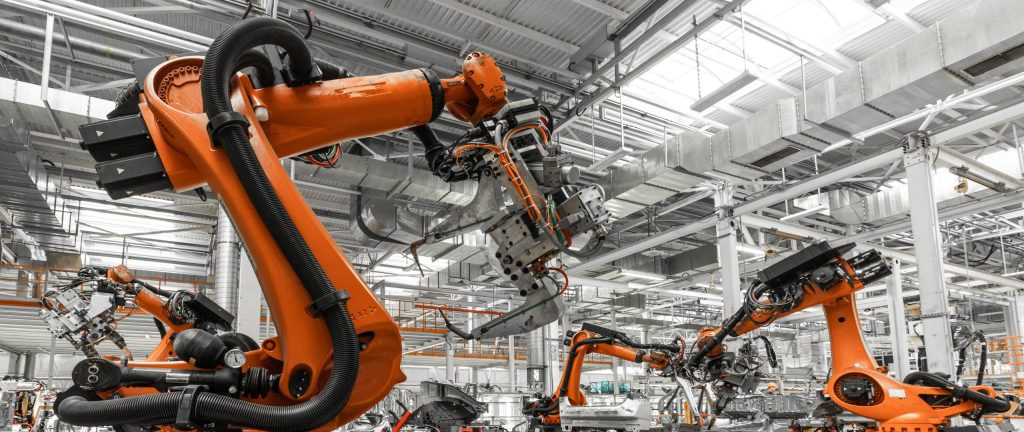Impact of Artificial Intelligence on business
The world is undergoing a technological revolution which is evolving with exponential velocity. Innovative technological trends such as Artificial Intelligence (AI), the Internet of Things (IoT), Blockchain, robotics, 3D printing, nanotechnology, or augmented and virtual reality, emerge and converge bringing about a new digital era.
Other Market Overviews
What are the main challenges for the automotive industry
The automotive industry is facing several challenges and opportunities in the current market environment. One of the major challenges is the shift towards electric and autonomous vehicles, which is disrupting ..
The world is undergoing a technological revolution which is evolving with exponential velocity. Innovative technological trends such as Artificial Intelligence (AI), the Internet of Things (IoT), Blockchain, robotics, 3D printing, nanotechnology, or augmented and virtual reality, emerge and converge bringing about a new digital era.
AI is one of the current buzzwords and it refers to the simulation of human intelligence processes by machines, particularly computer systems. And whether we realize it or not, AI is also becoming an integral part of our daily lives. Specific applications of AI include expert systems for decision making and problem solving, natural language processing, pattern recognition, or image and speech/audio recognition.
Nevertheless, it is important to underline that there is nothing new under the sun because AI is nothing but the natural evolution of programming or code based on rules-based logic. By incorporating both knowledge-based and expert systems, as well as by recognizing patterns (e.g. machine learning), AI intends to emulate human thought and perform tasks in real-world environments. It must be underlined, though, that self-consciousness does not yet exist among machines. They are just following a set of rules and being able to read inputs using sensors, as well as digesting a growing amount of data to make better decisions, instead of becoming able to develop autonomous thought (because we are not there yet).
There are several types of AI designed to perform different tasks and solve different problems, among which:
| Type | Description |
|---|---|
Generative AI |
|
Explainable or Transparent AI |
|
Sustainable or Responsible AI |
|
The spectrum covered by AI is huge. What we are currently witnessing are AI functions being used to automate tasks that would take any human a lot of time to perform while increasing their accuracy. Among many other examples, Al-powered products and services have the potential to lead to new medicines, improve inventory and logistics operations management, optimize forecasting and risk management, offer customized responses in a timely manner, quickly diagnose medical conditions, speed the transition to a low-carbon economy, or enable a better retirement for the elder to enjoy more dignity. The economic gains alone could be enormous. According to some estimates, AI could contribute more than $15 trillion to the global economy by 2030, roughly the current output of China and India combined. Of this, around 40% could be derived from increased productivity and the remaining 60% from consumption-side effects.
AI has the potential to improve nearly every aspect of our lives and work, but it also creates serious risks. New governance frameworks, protocols, and policy systems are needed to ensure all-inclusive and equitable benefits. In that respect, experts in the field have already argued that some sort of regulatory intervention by governments will also be required to mitigate the risks of increasingly powerful models. However, new and complex technologies like AI are extremely difficult to regulate because they are non-linear and their consequences cannot be anticipated with certainty. To make it even more difficult, global coordination will be needed to set up rules over the technology. Intellectual property management, avoiding privacy and cyber security breaches, and biased programming are other issues to consider.
All in all, AI is expected to change the business world and create enormous benefits for firms and customers. It can also enable the creation of massive competitive advantage for those who know how to make the most of it. Companies stand to achieve meaningful value from their investments in AI but scaling it across the business is a challenging task. According to research by BCG, firms typically dedicate 10% of their AI investment to algorithms, 20% to technologies, and 70% to embedding AI into business processes and agile ways of working. Therefore, they are investing twice as much in people and processes as they do in technologies. In fact, without the right approach and focus on change management strategy, it becomes nearly impossible to achieve AI at scale across the business.
About the author

Carles Iborra Santamaría
Partner – Financial Advisory
Graduated in Business Administration from ESADE and an MBA from MIT, he has more than 20 years of consulting experience in companies such as Arthur D. Little, Boston Consulting or Banca Mora, among others.
Related Services
Operations
Operations consulting services help businesses improve their operational efficiency and effectiveness. These services provide expert guidance on how to optimize business processes...
Procurement
Procurement consulting services help businesses optimize their procurement processes to achieve cost savings, improve efficiency, and enhance overall procurement performance...
Learning & Development
Learning and development consulting services are designed to help businesses improve their employees’ skills, knowledge, and performance. These services...
Private Equity
Private equity consulting services provide guidance and support to private equity firms and their portfolio companies. These services help private equity firms to maximize...
Our 360º M&A Services
Ready to explore the opportunites?
We collaborate with visionary professionals who are determined to shape the future rather than shy away from it. Through our joint efforts, we attain remarkable results that surpass expectations.

